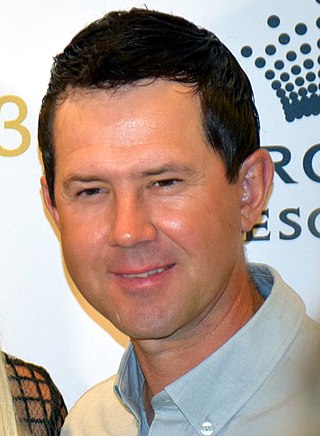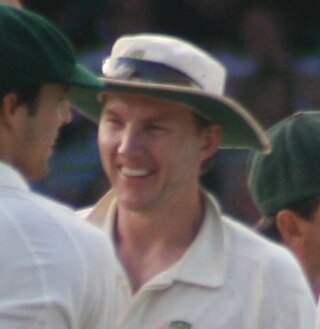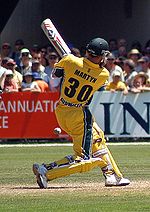
Stephen Rodger Waugh is an Australian former international cricketer and twin brother of cricketer Mark Waugh. A right-handed batsman and a medium-pace bowler, Waugh is considered one of the greatest cricketers of all time. Waugh was a part of the Australian team that won their first world title during the 1987 Cricket World Cup. As Australian captain from 1997 to 2004, he led Australia to fifteen of their record sixteen consecutive Test wins, and to victory in the 1999 Cricket World Cup. Waugh is considered the most successful Test captain in history with 41 victories and a winning ratio of 72%.

The 2003 ICC Cricket World Cup was the eighth Cricket World Cup, organised by the International Cricket Council (ICC). It was co-hosted by South Africa, Zimbabwe and Kenya from 9 February to 23 March 2003. This edition of the World Cup was the first to be played in Africa.

Ricky Thomas Ponting is an Australian cricket coach, commentator, and former cricketer. Ponting was captain of the Australian national team between 2004 and 2011 in Test cricket and 2002 and 2011 in One Day Internationals (ODIs) and is the most successful captain in international cricket history, with 220 victories in 324 matches with a winning rate of 67.91%. He stands third in the list of cricketers by number of international centuries scored. He holds the record for winning most ICC tournaments as a captain in Men's Cricket. Under his Captaincy Australia won the 2003 and 2007 Cricket World Cups and 2006 and 2009 Champions Trophies. He was also a member of the Australian team that won the 1999 Cricket World Cup.

Wasim Akram HI is a Pakistani cricket commentator, coach, and former cricketer and captain of the Pakistan national cricket team. Akram is regarded as one of the greatest fast bowlers of all time, as well as one of the greatest left-arm fast bowlers in cricket history. He is often revered as The Sultan of Swing . In October 2013, Wasim Akram was the only Pakistani cricketer to be named in an all-time Test World XI to mark the 150th anniversary of Wisden Cricketers' Almanack. As captain, he led Pakistan to the finals of the 1999 Cricket World Cup, where they lost to Australia by 8 wickets.

Brett Lee is an Australian former international cricketer, who played all three formats of the game. During his international career, Lee was recognised as one of the fastest bowlers in the world. With his time representing Australia, Lee won multiple ICC titles with the team: the 2003 Cricket World Cup, the 2007 Cricket World Cup, the 2006 ICC Champions Trophy, and the 2009 ICC Champions Trophy. Lee was the first bowler to take a hat-trick in the T20 format of the game which he did in 2007 ICC World Twenty20 in the inaugural tournament against Bangladesh, subsequently being the first bowler to do so at an ICC Men's T20 World Cup. Lee was also the first Australian bowler to take a hat-trick at a Cricket World Cup which he did in the 2003 Cricket World Cup Super Match game against Kenya.
The Bangladesh National Cricket Team toured England for the first time in 2005. Coming into the tour, Bangladesh had clinched their first ever test series win, against Zimbabwe but were still last in the ICC Test Championship table. England, under Michael Vaughan's captaincy, had moved to second in the Test points table.
The England cricket team toured Australia in 2002–03, playing a five-Test series for The Ashes and a number of tour matches against Australian domestic teams. They also played a triangular ODI series against Australia and Sri Lanka. The first Test of the series, at Brisbane, was the 800th Test match to be played by England.

Daryl Raymond Tuffey is a former New Zealand cricketer who represented New Zealand in all formats internationally. Tuffey was born in Milton, Otago, and played domestic first-class cricket for Northern Districts Knights. Tuffey retired from all forms of cricket on 14 September 2012.
The 5th One Day International cricket match between South Africa and Australia was played on 12 March 2006 at New Wanderers Stadium, Johannesburg. The match broke many cricket records, including both the first and the second team innings score of over 400 runs. Australia won the toss and elected to bat first. They scored 434 for 4 off their 50 overs, breaking the previous record of 398–5 by Sri Lanka against Kenya in 1996. In reply, South Africa scored 438–9, winning by one wicket with one ball to spare. The match has been acclaimed as the greatest One Day International match ever played and has been referred to as the "438 match" or "438 game" in the media.
The Australian cricket team ended the 2005–06 season by touring Bangladesh in April 2006. The series was seen as an uneventful way to end the season as Australia, who were twenty points clear of second place in the ICC Test Championship, played a Bangladeshi team who had won one Test match in their cricketing history and were ranked at the bottom, over 100 points behind Australia. Bangladesh, however, wanted to refute comments made by the tourists' captain, Ricky Ponting who told London's The Daily Telegraph in February ""What I would not have is the minnow nations in the World Cup and the Champions Trophy, and I would not have Bangladesh and Zimbabwe playing Tests at present." On arrival, Ponting pointed out, in support of the home side, that "maybe Bangladesh having Test status will take the game forward". On the back of a three-Test whitewash tour of South Africa, but a 3–2 loss in ODI matches, Australia came to Bangladesh to play two Tests and three One-day International matches, without any warm-up touring matches.

India's 2003–04 tour of Australia was composed of seven first-class matches, including four Tests. India also participated in an ODI tri-series with Australia and Zimbabwe. The Test series was drawn 1–1, and India retained the Border-Gavaskar Trophy because of their victory in the Trophy's previous contest. In the 2003-04 series' Adelaide Test, Rahul Dravid scored a double century, securing a famous win for India. Sachin Tendulkar scored 241* in Sydney, which up until that point in his career was his highest score in a Test match. Captain Sourav Ganguly made his first test century against Australia, a 144 in Brisbane that gave his team a lead of 86 after they were in trouble. VVS Laxman played consistently well throughout this series, most notably his contribution in the Adelaide test is well remembered. This series was also the last for Steve Waugh, who had captained Australia to a record equalling 16 consecutive test match victories and had 41 victories in 57 Tests.
The Australia national cricket team toured South Africa from February to April 1994 and played a three-match Test series against the South Africa national cricket team. The tour was Australia's first to South Africa since the end of the apartheid regime which had led to a sporting boycott of the country. Australia's most recent tour to South Africa had taken place in 1969–70 and a planned tour of the country in 1971–72 had been cancelled after the International Cricket Conference had imposed a moratorium on tours in 1970 and following the player withdrawals and protests which accompanied the tour of Australia by the South African rugby union side during 1971. The Australian Cricket Board postponed their proposed tour of Sri Lanka in order to schedule the series, paying A$50,000 compensation to the Board of Control for Cricket in Sri Lanka.

The Australian cricket team toured the West Indies from April to June, 2003, outside the normal West Indies cricket season, to play for the Frank Worrell Trophy.
The Australian cricket team toured India from February to April 2001 for a three-Test series and a five-match ODI series. The series is considered one of India's finest, as they secured victory against Australia in the Test series, in the process breaking Australia's 16-match win streak in Tests, and being the third side to win a Test match after being asked to follow-on during the match in Kolkata. The Kolkata match has been widely regarded as one of the greatest matches in the sport's history.
This article contains information, results and statistics regarding the Australian national cricket team in the 2007–08 season. Statisticians class the 2007–08 season as those matches played on tours that started between September 2007 and April 2008.
The 2001–02 Australia Tri-Nation Series was a One Day International (ODI) cricket tri-series where Australia played host to New Zealand and South Africa. After drawing with New Zealand and defeating South Africa in the preceding Test series, Australia went into the tournament as favourites; however, they failed to reach the final; and captain Steve Waugh was consequently sacked as ODI captain, replaced by Ricky Ponting.
The Australian cricket team toured India from February to April 1998 for a three Test series and an ODI tri-series featuring Australia, India and Zimbabwe.
The Scotland national cricket team represents Scotland in the game of cricket. In 1992 Scotland severed their ties with the Test and County Cricket Board and with English cricket, and gained associate membership of the International Cricket Council (ICC) in their own right in 1994. They competed in the ICC Trophy for the first time in 1997, finishing third and qualifying for the 1999 World Cup, where they lost all their games. They also qualified for the 2007 and 2015 World Cups.











